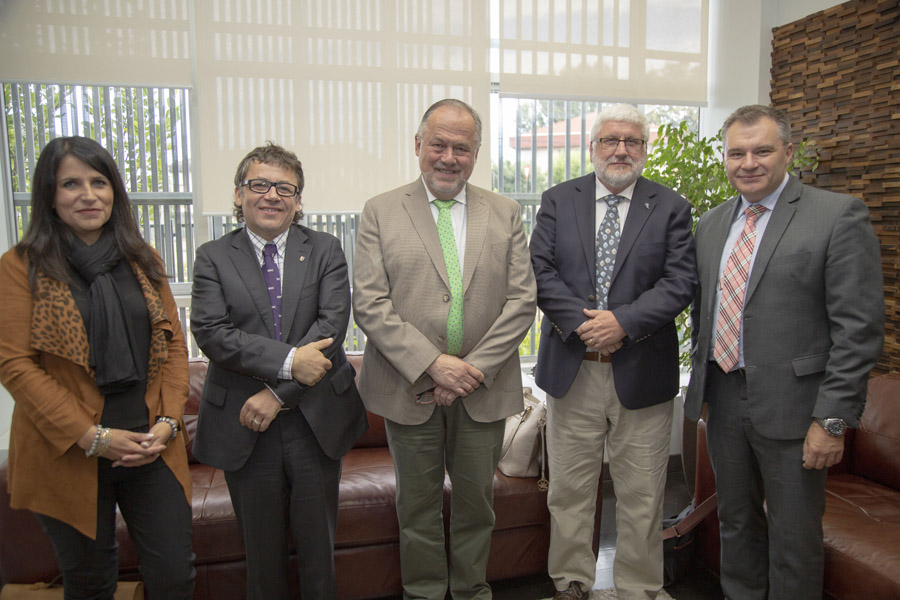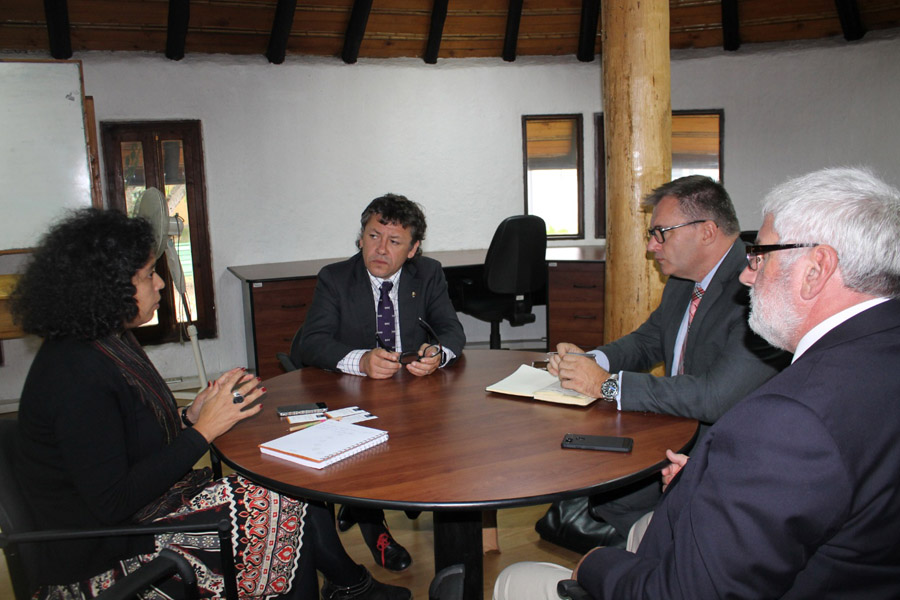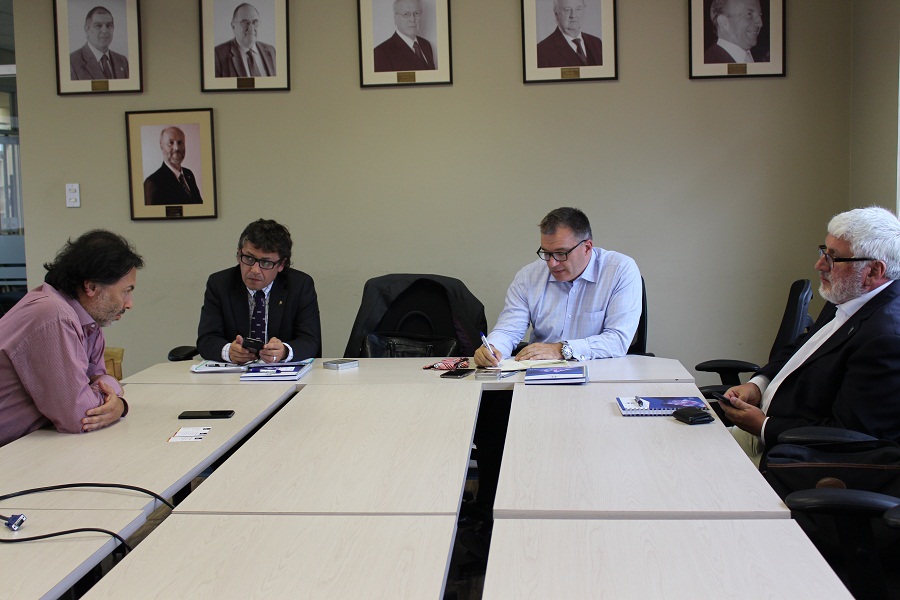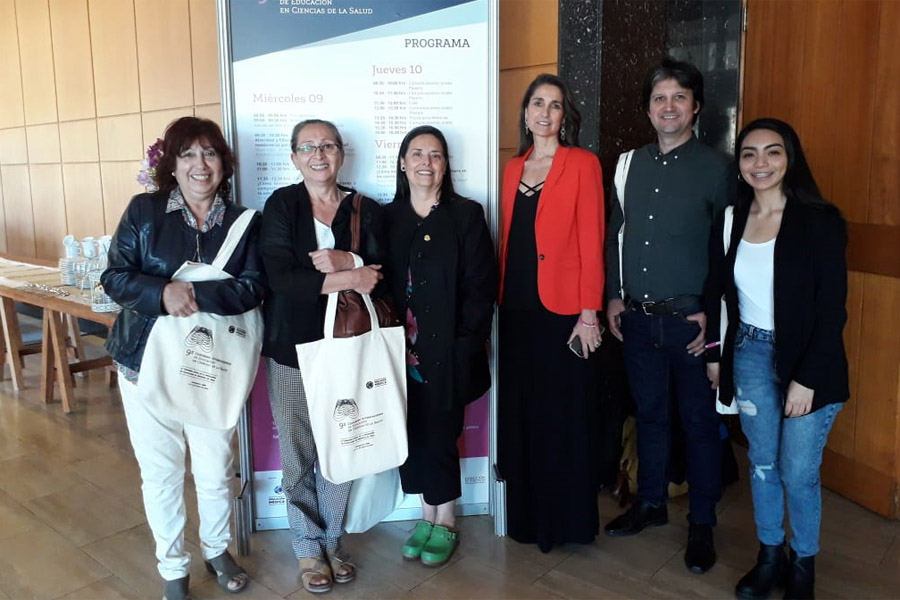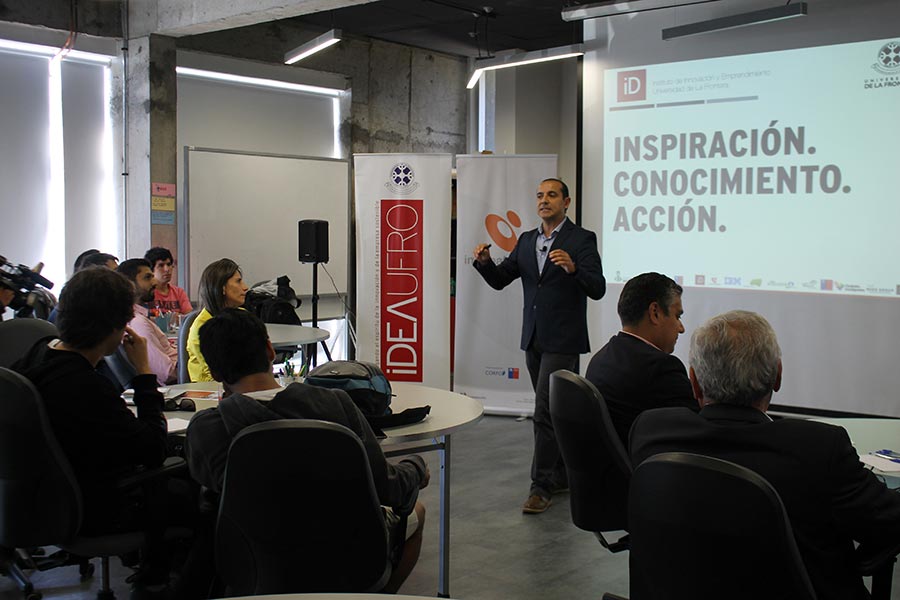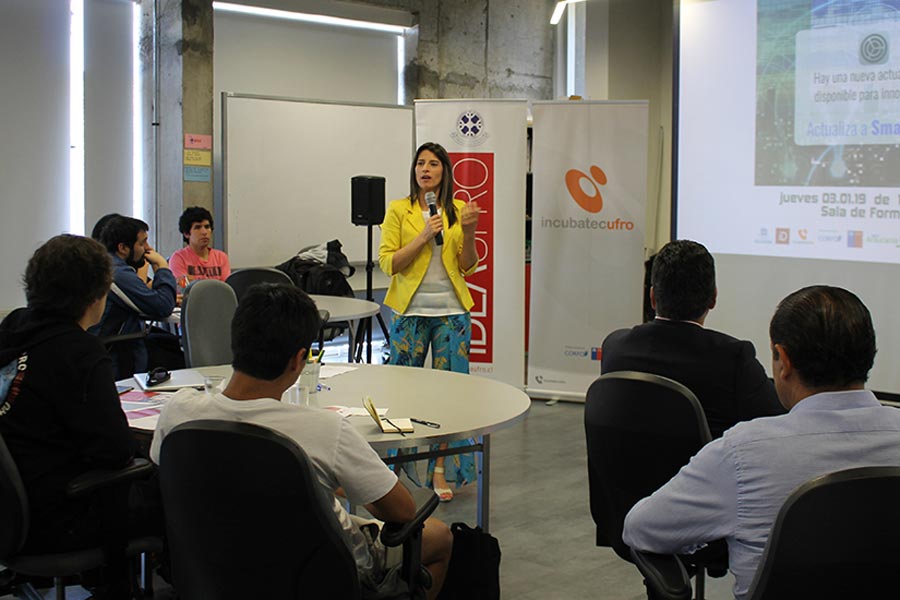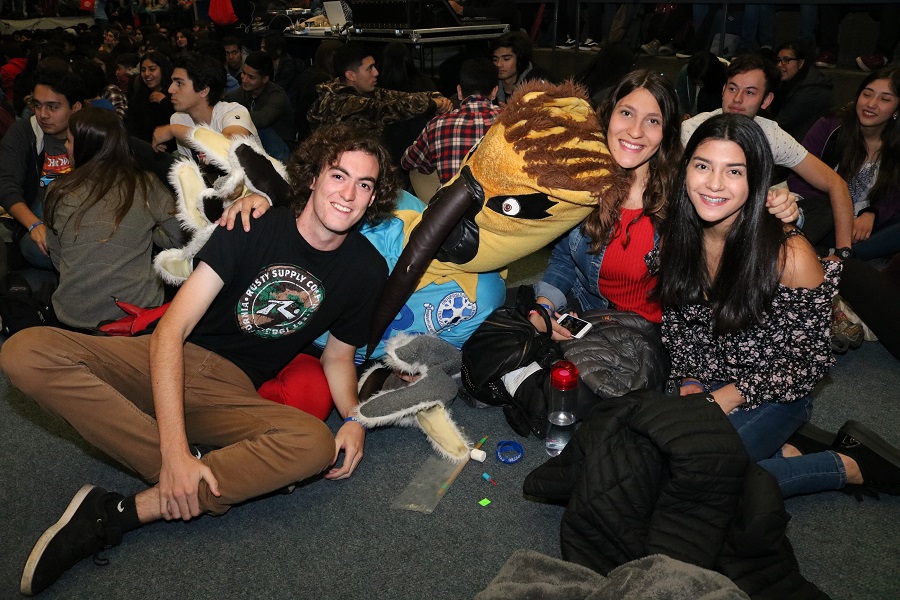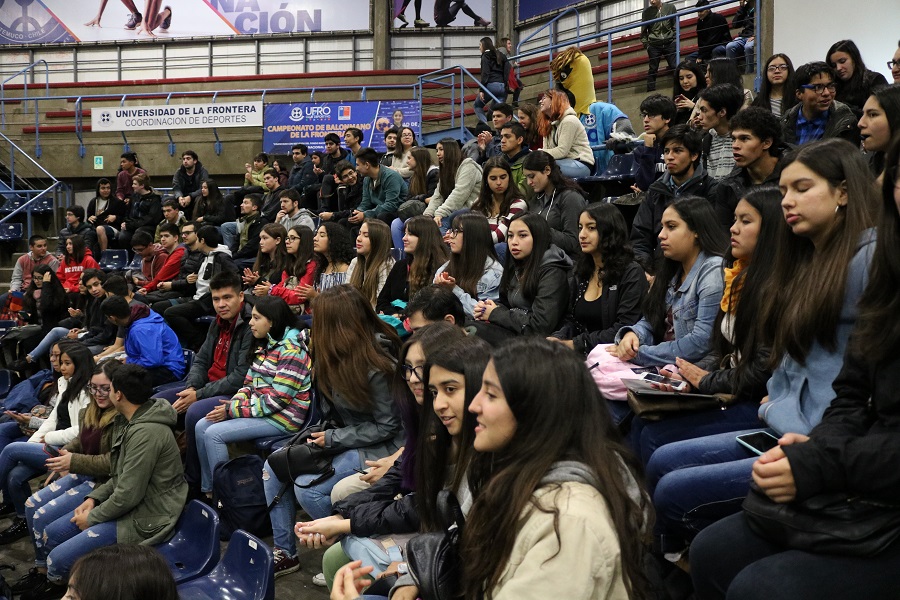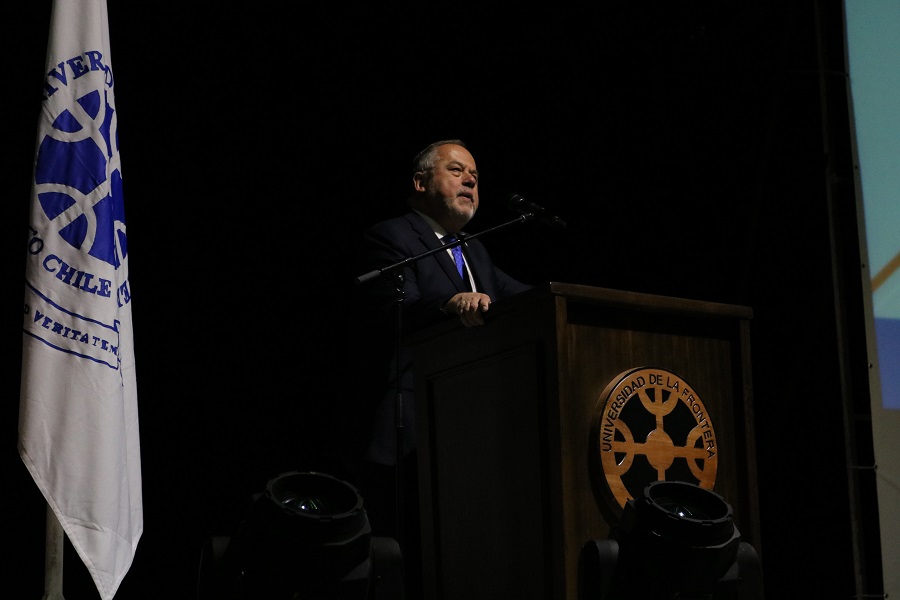|
Thanks to the work of the International Affairs Office in accordance with the interests of the institution from New Zealand an auspicious work agenda has been developed that included a meeting with the Rector, Dr. Eduardo Hebel, the Vice-Rector for Research and Graduate Studies, researchers and academics of BIOREN, the Institute of Indigenous Studies, and the Faculty of Engineering and Science. |
A delegation of three members of the Auckland University of Technology (AUT) from New Zealand came to the Universidad de La Frontera and established through this visit a first approach with Chilean institutions, since they want to ensure a greater openness to South America. These are initial links that might lead to an academic cooperation and student mobility between these two universities. One of the new strategies of internationalization in New Zealand is to open up towards new territories and countries for cooperation. “We are here because, until now, almost all the institutions with which we have international cooperation agreements are in Asia and we consider that South America should be our next destination for international development”, Ricardo Chacón of the AUT commented. According to Ricardo Chacón, the AUT categorized the Universidad de La Frontera as one of the three institutions that are suitable for this objective, and Chile, Brazil and Colombia as key countries. “We have been looking into several institutions to see which ones are suitable for a mutual cooperation, according to our mutual capabilities. And it is not randomly that we included visits at the Universidad Católica de Valparaíso, Universidad de Santiago de Chile and the Universidad de La Frontera in our schedule. The UFRO was chosen because of its experience in the field of interculturality (Mapuche People), the development of engineering solutions for big projects and for its past, for being heir of a technical university”, he confirmed. FIRST LINKS The director of the International Affairs Office of the UFRO, Dr. Berta Schnettler, manifested great interest in concrete formal agreements and partnerships regarding Oceania and said that this was a great opportunity for both universities: “We realize that, if we are interested in creating strong links with new strategic partners abroad, the best way is to start a partnership step by step, on which we can build cooperative networks that really are of mutual interest”. After a tour to get to know the Scientific and Technological Bioresource Nucleus (BIOREN), the Institute of Indigenous Studies and the Deanery of the Faculty of Engineering and Science, the representatives of the Auckland University of Technology announced another visit in September. “We are very satisfied with the results and we see a possibility to contribute to how the universities participate in the development of the indigenous world, and we hope to be able to open new opportunities for the exchange of students of Mapuche and Maori origin through our doctorate programs. On the other hand, we notice that the Faculty of Engineering and Science of the UFRO has great potential regarding the curriculum and program design, as well as regarding the different fields of research,” Dr. Guy Littlefair, the Pro-Vice Chancellor and Dean of the Faculty of Design and Creative Technologies at AUT, said.  Written by: UFRO Communications Office Written by: UFRO Communications OfficeThis email address is being protected from spambots. You need JavaScript enabled to view it. |
|
The 9th congress took place at the Universidad de Concepción, Chile, from January 9 to 11, with high participation of academics of the Faculty of Medicine of the Universidad de La Frontera (UFRO). |
Also other works of the UFRO have been presented in the congress, such as the oral presentations “Self-directed learning for freshmen, Faculty of Medicine, Universidad de La Frontera” by the authors: Nancy Navarro, Mónica Illesca, Resi Gittermann, Carolina Rascón, Mirtha Cabezas, Rossana Rojo, Luis González and Romina Garrido (external Diufro project die18-0007); “Significance for interns of the Faculty of Medicine of the interdisciplinary program in a rural commune” by the authors Carolina Moreno, Rossana Rojo and Nancy Navarro; “Design and validation of an instrument for the evaluation of clinical teaching in health programs” by the authors Nancy Navarro, Mónica Illesca, Cristian Cerda, Rossana Rojo, Resi Gittermann and Luis González; and “Clinical simulation: opinions of the students at the Universidad Autónoma de Chile, Temuco” by the authors Mónica Illesca, Roxana Novoa, Mirtha Cabezas and Luis González. In the category poster presentation, the UFRO was represented by the work “Clinical Simulation Center project for postgraduate students of the Universidad de La Frontera” by Susana Cisterna and Mónica Illesca; and the academics Mónica Illesca and Nancy Navarro were in charge of the workshop “Design of a student-centered test instrument”.  Written by: Fabián Aguirre Written by: Fabián AguirreFaculty of Medicine |
|
The Smart Day was the moment chosen by the UFRO and CORFO to present the “Smart Mobility 2020” strategy, which is part of the Chilean strategy of the Smart City project. The Universidad de La Frontera will participate in this strategy via the incubation of technological services through Conexity funds and the training of professionals in a further education program in Innovation and e-business, which starts in April. |
The continuous development of technologies and its use regarding Big Data, artificial intelligence and the Internet of Things, etc., have transformed the way of how we connect and interact with our environment and are also creating a new understanding of business and entrepreneurship, accelerating the needs of the country to have human capital that is able to work in the environment of Industry 4.0, with new capabilities and knowledge. IDEAUFRO, together with IncubatecUFRO and the support of CORFO, launched an action plan that starts in 2019 with the Smart Day, an open invitation for tech entrepreneurs and experts, such as Nicolás Grandón, who is in charge of the Smart Cities Unit of the Ministry of Transportation and Telecommunications in Chile, in order to discuss the digital transformation of business and value creation through collective intelligence. Isaacs emphasized the networking between public and private institutions that participated in this initiative and the ones who will be part of the first generation of students in the further education program “Digitalization and New Businesses, Industry 4.0”, which the UFRO will start together with IBM and the Waterworks Aguas Araucanía, and the support of CORFO. “The classes of this program start in April 2019, with high-level teachers, such as the Indian scientist Damodarán Ramán, renowned for the development of rocket and satellite components and algorithms in the aerospace industry of his country,” Isaacs stated. INTELLIGENT CITIES Responding to the worldwide tendency to make use of solutions of collective intelligence and connected citizens, the Ministry of Transportation and Telecommunications in Chile made use of this possibility to present the Smart City strategy “Smart Mobility 2020”, which will be tested in six Chilean cities – Temuco is one of them – and seeks to support the creation, development and validation of technological endeavors in early stages, which address the global challenges of smart cities related to the environment, quality of life and smart economy. For this purpose, CORFO launched a fund of 180 million Chilean pesos in the Araucanía Region for the launch of technological initiatives that offer solutions for the different challenges that are part of smart cities. This is how the program Conexity, launched by Incubatec UFRO, joins the idea to use the region as a natural laboratory for testing new developments and endeavors that solve the critical challenges of a smart city with the help of technology. “The purpose is to develop technological prototypes and to put into practice some of the proposals of our regional entrepreneurs, in order to find pilot solutions that contribute to the establishment of a Smart City and the regional industry, through trial and error method,” Claudina Uribe, the director of Incubatec UFRO of the Universidad de La Frontera, said. She also emphasized that this program, which will be carried out during twelve months, responds to the strategic guidelines the UFRO is working on for some years, regarding the development and training of high-quality professionals and human capital, with technological tools for their professional improvement and which they can make use of.
Escrito por: Communications Office
|
|
The rector, Dr. Eduardo Hebel, received the new students and invited them to enjoy university life and to be part of this institution of excellence. The activities of the University Insertion Program (PIU) took place during the first days of March. |
Dr. Eduardo Hebel, the rector of the Universidad de La Frontera, invited the 2300 new undergraduate students during the welcoming ceremony 2019 to enjoy university life and to be proud of being part of this university that is one of the “Universities of Excellence” in Chile. The freshmen came to the Olympic Stadium of the university to start this new stage in their lives, being part of one of the 45 undergraduate programs at the six different faculties of the Universidad de La Frontera. They have been welcomed by university authorities, the program directors and higher-grade students. “A very special time in your lives is starting today and it will mark you for life. Each experience you will gain during the learning process for your future profession will be really important. I invite you to make the best out of this time, to enjoy it and, above all, I hope that it will be a success for your personal and professional development and that you will be able to make and be part of the social changes our region and our country need.” This was part of the message the rector, Eduardo Hebel, delivered to the new students. The university authority emphasized that the UFRO receives this new generation of students with a recent accreditation of six years in all areas and with big challenges in the fields of research, internationalization and interculturality. The ceremony started with a presentation of the Folkloric Ballet of the Universidad de La Frontera called “Magia Chilena”, who showed their full artistic talent in order to give the freshmen a special welcome. The activities at the welcoming ceremony for the new UFRO students in 2019 have been organized by the University Insertion Program (PIU), which promotes an easier start in higher education for freshmen. “I chose the UFRO because it has all I need and it is the best option in the whole region for studying what I wanted to. I really liked the activities at the welcoming ceremony. It helped to get to know our fellow students better and to get to know the university authorities”, Nicolás Morales said, who just entered the program in Physical Education Pedagogy, Sports and Recreation. “This welcoming ceremony is very fun and helps a lot to prepare for what is coming next. I think that this welcoming activity is unique and I liked that the activities included everyone. I chose the UFRO because I always knew that it provides an education of high quality”, Fredy Araos confirmed, who is beginning to study Law.
Escrito por: UFRO Communications Office
|
|
Within three days, the UFRO reached a number of 2,273 new students matriculated and fills all the vacancies in the process of admission. |
The Universidad de La Frontera consolidates its leadership regarding prestige and quality within the group of Universities of Excellence in Chile by filling 100% of the total vacancies in the first matriculation stage 2019. It only took three days to reach a total of 2,273 new students matriculated, a number that corresponds to the total of vacancies in this admission process, which took place at the Olympic Stadium of the Universidad de La Frontera. 80% of the new UFRO students come from the Araucanía Region – 32% of them from municipal schools, and 29% of Mapuche descent. Regarding inclusion, the numbers show that 49% of the new UFRO students are women, 7% are persons with disabilities, and 6 students have nationalities other than Chilean. “The matriculation process is one of the most important moments for our university in terms of management. This is why it is very comforting to see that the work of all of us as one team allows us to reach our goals. I want to thank each and every one of the units that have been working to achieve the objective for their efforts and dedication,” the rector, Dr. Eduardo Hebel, said to the hundreds of senior students, professionals, academics and directors who have been working in the matriculation process 2019. One of the keys for the success of this year´s matriculation process were the capabilities and coordination of the different units that participated in the matriculation process: matriculation teams, cahiers, promotion of study-programs, student development, comprehensive training, informatics, institutional analysis, the programs PACE and “I want to be a teacher”, finances, communications and general services. And last but not least, the directors and staff of the Aula Magna and the Olympic Stadium who provided their spaces to carry out the activities.  Written by: Communications Office UFRO Written by: Communications Office UFROThis email address is being protected from spambots. You need JavaScript enabled to view it. |





